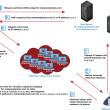As the big tech corporations are coming under increased attack from hackers, it can make the domestic users unsure of which way they can turn to best protect themselves against cyber-attack: if the big guns are struggling, how does the average Joe keep his personal data safe?
No matter how soon new software is available, new scams arise that have identified and taken advantage of the flaws that the makers were previously unaware of. Defense against cyber-criminals needs to be multi-layered to ensure that the risk of security breaches is minimized. Here are 3 ways that you can protect yourself against online attack.
You will be aware of the threats that come to you via e-mails. They come in many guises and are usually quite easy to identify – if you know where to look. Check out the sender’s e-mail address. Typically, the name displayed will be of the trusted organization, but the e-mail address from which it sent will be quite clearly not them. Never respond to these phishing e-mails, by replying you are confirming to the sender that they have a legitimate e-mail address.
If the e-mail’s content is sent from an authentic organization, there will be no spelling mistakes or requests for personal data. Never click on a link that the e-mail has provided. Contact the alleged sender by the details on the genuine website. An authentic bank, for example, would never request that you input personal details, and even if the e-mails say that they have identified a security breach that you need to clarify, your bank would telephone you or contact you via letter.
Passwords
Your passwords need to be complex. Never choose your date of birth, the name of your child, or another piece of information that could be found in the public domain. Each app and website that you need to log on to should have a different password. Remembering all your different passwords can be troublesome, and as it is advised that you don’t jot them down, you can use heavily encrypted software to store the passwords.
This may feel counterintuitive, but as 81% of business security breaches are due to password weaknesses, it is advisable to use enterprise level security in the domestic sphere. You can find out more about this software by clicking here to read the LastPass review to further understand the benefits available to you.
Update
Software security updates are regularly distributed by service providers. They are released as new threats and viruses are identified, and failing to update your desktop or other devices means that you are not protected by the latest security versions of the software. While you may think that the update is only to fix cosmetic bugs, the reality is that the updates contain essential security fixes that have been coded to protect you, the user.
The information that you provide websites and apps is enough for hackers to exploit you for their benefit. Think about what you sign up for and the information that you are providing. It is prudent to have a separate e-mail address that you can use for the non-important communications: newsletters, competitions and the such like. Update your devices as and when requested to, and choose passwords that are complex to make life as hard as possible for the scammers.
Top, featured image via DepositPhotos/Hipspeeds









